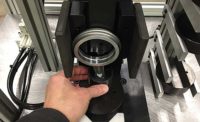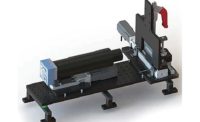Roller bearings are a critical component of modern machinery. When the bearing is in operation, the cage must be able to withstand centrifugal force, shock and vibration, especially with complex loads rotating at high speeds. Considerable heat is generated due to the sliding friction between the cage and rolling body. The combination of force and heat can make the cage fail. It may even burn or break.
As a result, bearing manufacturers have strict requirements for materials, precision and production technologies.
Substandard bearing cages can be produced by worn molds and unstable grinding equipment. These problems manifest themselves in defects such as flash, scorches and scratches on the inner rings, outer rings, roller slots, clip surfaces and ribs. A vision system can detect such defects in real-time to ensure quality and alert technicians when maintenance of production equipment is needed.
When a leading Chinese manufacturer of roller bearings and linear motion products needed a vision system to do just that, the company turned to local automation supplier Suzhou M-vision Electronic Technology Co. Ltd. for help. Suzhou M-vision specializes in developing machine vision systems for manufacturing lines in a variety of industries, including automotive, photovoltaics and semiconductors.
In this case, Suzhou M-vision was tasked with detecting defects in the inner and outer rings of bearing cages during production. The cycle time is just 0.4 second. To accurately view and detect defects, the camera must have high image quality and speed. After testing various brands of cameras and comparing the quality and stability of all images captured, Suzhou M-vision chose two 5-megapixel Manta G-505 cameras from Allied Vision.
The camera is equipped with the powerful 0.67-inch Sony ICX625 image sensor, which is suitable for many applications such as industrial imaging and inspection. With a frame rate of 15 images per second, it fully satisfies the application’s imaging requirements. The system also includes an OPTO pinhole lens PCHI 023 and OPTO pericentric lens PC 23030XS to take clear images of the outer and inner rings of the bearing cage.
The Manta is Allied Vision’s most versatile GigE Vision camera, with a wide range of sensors and features. Thanks to the modular concept, engineers can choose from a wide range of hardware options, including Power-over-Ethernet support, various optical filters, angled head configuration, and board-level variants.
To optimize system costs, Manta cameras also support single-cable and control via the Ethernet cable. In addition, multiple cameras can be precisely synchronized when utilizing the precision time protocol. Features include automatic exposure, gain and white balance.
The bearing manufacturer makes two types of bearing cages: die cast and molding cages. Both can isolate and guide the rollers while keeping them within the bearing. Suzhou M-vision has developed software specifically to detect defects in the inner and outer rings of the bearing cages.
“The M-Vision bearing cage detection system has greatly improved the production fault rate. It also reminds the bearing manufacturer to preform timely equipment maintenance, which consistently maintains product quality,” says Cheng Xiuqing, the technical director of M-vision. “The main reason we chose the Allied Vision Manta camera is its ability to capture high-quality images, allowing us to quickly determine product quality and eliminating the need to confirm the image quality repeatedly.
“Allied Vision cameras are very stable and reliable, even in harsh manufacturing environments. It can satisfy the requirements of 24/7 at the customer’s factories, ensuring consistent and accurate operation.”
For more information on vision systems, visit www.alliedvision.com.









